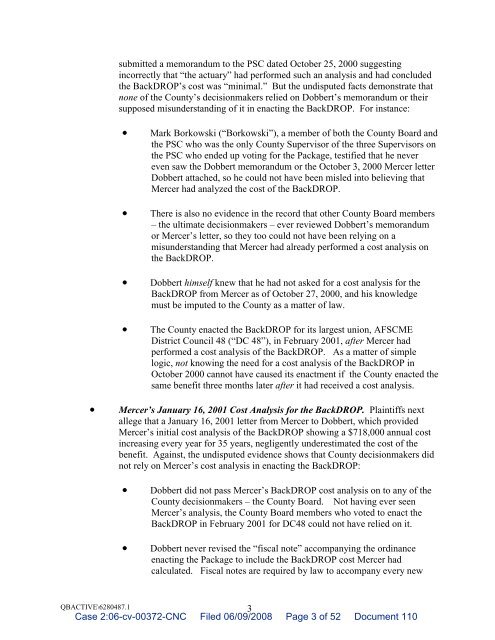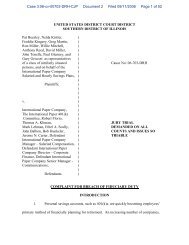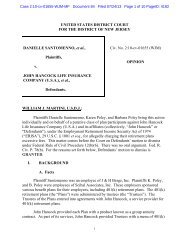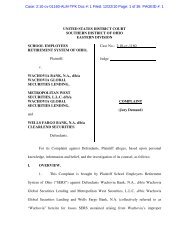eastern district of wisconsin milwaukee county, employee
eastern district of wisconsin milwaukee county, employee
eastern district of wisconsin milwaukee county, employee
You also want an ePaper? Increase the reach of your titles
YUMPU automatically turns print PDFs into web optimized ePapers that Google loves.
submitted a memorandum to the PSC dated October 25, 2000 suggesting<br />
incorrectly that “the actuary” had performed such an analysis and had concluded<br />
the BackDROP’s cost was “minimal.” But the undisputed facts demonstrate that<br />
none <strong>of</strong> the County’s decisionmakers relied on Dobbert’s memorandum or their<br />
supposed misunderstanding <strong>of</strong> it in enacting the BackDROP. For instance:<br />
• Mark Borkowski (“Borkowski”), a member <strong>of</strong> both the County Board and<br />
the PSC who was the only County Supervisor <strong>of</strong> the three Supervisors on<br />
the PSC who ended up voting for the Package, testified that he never<br />
even saw the Dobbert memorandum or the October 3, 2000 Mercer letter<br />
Dobbert attached, so he could not have been misled into believing that<br />
Mercer had analyzed the cost <strong>of</strong> the BackDROP.<br />
• There is also no evidence in the record that other County Board members<br />
– the ultimate decisionmakers – ever reviewed Dobbert’s memorandum<br />
or Mercer’s letter, so they too could not have been relying on a<br />
misunderstanding that Mercer had already performed a cost analysis on<br />
the BackDROP.<br />
• Dobbert himself knew that he had not asked for a cost analysis for the<br />
BackDROP from Mercer as <strong>of</strong> October 27, 2000, and his knowledge<br />
must be imputed to the County as a matter <strong>of</strong> law.<br />
• The County enacted the BackDROP for its largest union, AFSCME<br />
District Council 48 (“DC 48”), in February 2001, after Mercer had<br />
performed a cost analysis <strong>of</strong> the BackDROP. As a matter <strong>of</strong> simple<br />
logic, not knowing the need for a cost analysis <strong>of</strong> the BackDROP in<br />
October 2000 cannot have caused its enactment if the County enacted the<br />
same benefit three months later after it had received a cost analysis.<br />
• Mercer’s January 16, 2001 Cost Analysis for the BackDROP. Plaintiffs next<br />
allege that a January 16, 2001 letter from Mercer to Dobbert, which provided<br />
Mercer’s initial cost analysis <strong>of</strong> the BackDROP showing a $718,000 annual cost<br />
increasing every year for 35 years, negligently underestimated the cost <strong>of</strong> the<br />
benefit. Against, the undisputed evidence shows that County decisionmakers did<br />
not rely on Mercer’s cost analysis in enacting the BackDROP:<br />
• Dobbert did not pass Mercer’s BackDROP cost analysis on to any <strong>of</strong> the<br />
County decisionmakers – the County Board. Not having ever seen<br />
Mercer’s analysis, the County Board members who voted to enact the<br />
BackDROP in February 2001 for DC48 could not have relied on it.<br />
• Dobbert never revised the “fiscal note” accompanying the ordinance<br />
enacting the Package to include the BackDROP cost Mercer had<br />
calculated. Fiscal notes are required by law to accompany every new<br />
QBACTIVE\6280487.1 3<br />
Case 2:06-cv-00372-CNC Filed 06/09/2008 Page 3 <strong>of</strong> 52 Document 110







